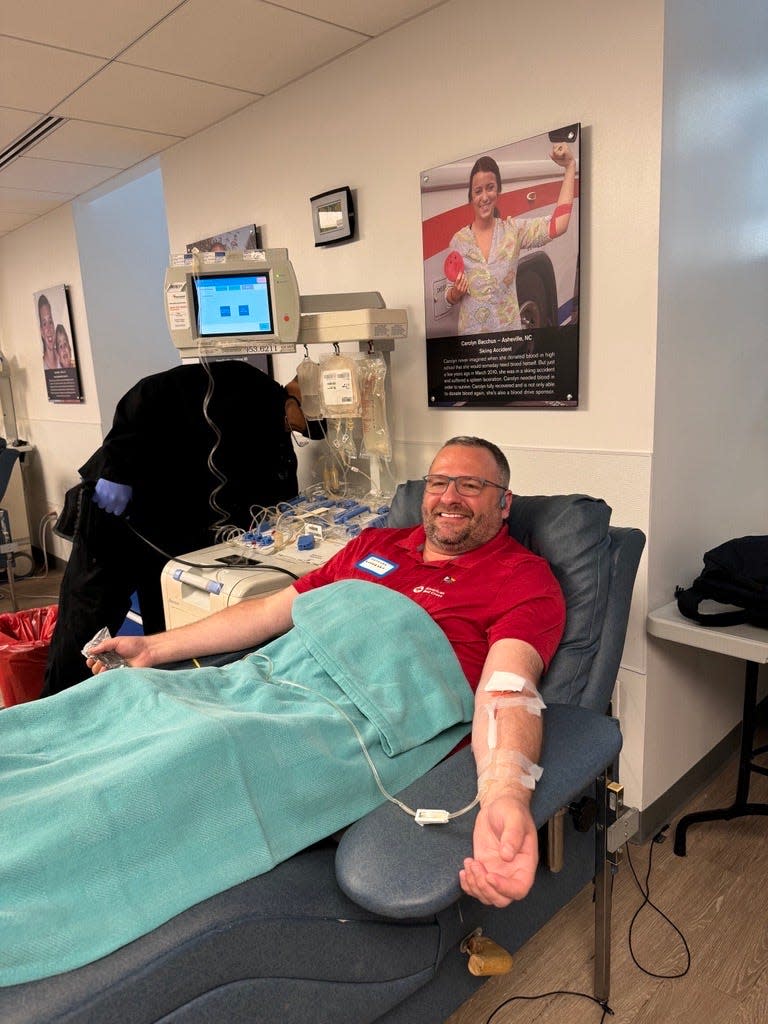Gay men can newly donate blood. They're feeling 'joy and relief.'
WASHINGTON – Doug Anderson – and his rare AB negative blood – are ready.
An American Red Cross employee, the 51-year-old will donate platelets for the first time today, his fifth time giving blood since his employer updated its screening guidelines for men who have sex with men. They can now donate blood regardless of their sexual orientation after a Food and Drug Administration rule change last year. Now the Red Cross will ask everyone the same questions about their sexual history – a "joy and relief" for many queer men.
Anderson, a gay man, proudly wore a Rainbow pride pin – attached to an apropos bright red shirt – to his donation appointment earlier this month in downtown Washington, signaling the magnitude of the moment during Pride Month.
"When people talk about inclusion, it's often framed as access to get something, but I would challenge that notion," he says, sitting across from me at a table outside the donation center, "and I think of inclusion also as access to give something."

'There's room for everybody'
The FDA's move follows years of advocacy and science-backed research aimed to strike down the 1983 ban on gay and bisexual men donating blood because of fear of HIV entering the blood supply. Progress has been slow but steady:
A decade ago, gay men could donate only if they abstained from sex for one year.
During early COVID, it was shortened to three months.
Now, gay and bisexual men in monogamous relationships can freely donate. Everyone, regardless of gender or sexual orientation, must wait three months if they wish to donate if they've had anal sex with new or multiple sexual partners (among other restrictions).
"We had never been able to donate in our entire adult lives," Anderson says. He and husband Dan Bennett of the D.C. metro area both donated last August.
"After not being able to do that for such a long time – we couldn't do it for the first 14 years of our relationship – so to be able to go and experience that together, it was really special," Bennett says. He has since become a volunteer who checks people in.
Anderson says: "It's been a thrill for me to see his journey evolve, since we've both been able to be part of this mission, and also hopefully let other people know that you're welcome in any way you want to participate, whether you want to give blood, or would you like to volunteer or donate financial resources. There's room for everybody at the table."
Get educated: Anal sex is stigmatized due to homophobia, experts say. It's time we start talking about it.
'You feel helpless'
Anderson came out his senior year of college in the mid-1990s the same year Ellen DeGeneres came out. "I can remember watching that show with my family and was like, 'Should I tell them now, or will they think I'm joking?'" Both he and Bennett lucked out with positive experiences, and the pair later met in Boston. They've been together 15 years and married almost 11 years.
For most of their marriage – and well before that – blood donation was never an option. Even when Anderson served in the Army and knew the critical need for blood, even when workplace blood drives would come and go throughout his career. Family members and friends going into surgery, or needing cancer treatment, and what could he do about it?
A self-described "roll-up my sleeves and do-something person," – pun unintended – he grew frustrated.
"You feel helpless in that situation," he says. "So I felt such a great sense of joy and relief when the FDA made the decision last year."
That's not to say the fight is over. Those who practice nonmonogamy still can't donate blood without that three-month barrier even if they are regularly tested for HIV, and ditto those who take oral PrEP.
"There's more work to do, but I'm hopeful that that work will continue," Anderson says.
Giving blood is good for you. Donating blood makes my skin look great.
'Plenty of other ways to give back'
This issue feels personal. A gay man myself, I've watched closely for updates to the FDA's policies. I have a boyfriend and am eligible to donate per new guidelines. As I walked through the clean, clinical blood donation facility, my pulse quickened and slowed, quickened and slowed. Blood pulsed through my own veins as I thought about all the people – gay, straight, whomever – who showed up to save lives that day.
Especially Anderson. He was looking forward to his hourslong donation and brought a mystery novel to listen to. He appreciated the meeting-free respite in his day. A platelet donation is different than a regular blood donation, and it takes roughly three hours and involves a machine that extracts just your platelets and returns your blood back.

It didn't faze Anderson as a staff member began poking his arm and hooking him up to said machine, which whirred and hummed in the background. A peaceful sound. Almost as peaceful as Anderson looked under his teal blanket, nestled in a spa-like lounge chair.
He encourages people to donate, donate, donate to keep up with the demand for blood: "The need is constant, but the supply isn't always constant."
And if you're ineligible for whatever reason – even as unjust as it may feel – remember "you don't have to give blood to be able to be part of the mission," Bennett says. "There's plenty of other ways to give back. So I think if it's important to somebody, look for a way that works for you. It doesn't have to be about just giving blood."
The words echoed. It doesn't have to be about just giving blood.
This article originally appeared on USA TODAY: Can gay men donate blood? Hear their stories


